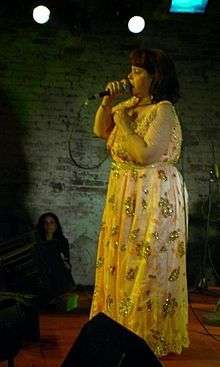Cheikha Rabia
| Cheikha Rabia | |
|---|---|
 Cheikha Rabia | |
| Background information | |
| Origin | Relizane, Algeria |
| Genres | Raï,[1] rock, electronica |
| Occupation(s) | Singer, songwriter |
| Instruments | Tambourine, voice |
| Years active | 1945–present |
| Labels | Virgin, Buda music/Tiferet Records, Dinamyte |
| Website |
dinamyte |
Cheikha Rabia is an Algerian singer born in Relizane (near Oran) in Algeria.
Biography
Born in Relizane in 1944, a city near Oran in Algeria, Rabia is the daughter of a barber (a veteran of World War I) and a seamstress originates from Kabylie. Cheikha Rabia began singing at 11 years old and discovered the singing women at celebrations and wedding parties. Female singers, called 'Meddehates was interpreted songs of lust traditionally sung privately by Algerian women at rural celebrations before exclusively female assemblies. Those songs were considered crude and unfit to be heard in polite society. Cheikha Remitti was one of the first to sing them in public and did so in the earthy language of the street, using a rich blend of slang and francarabe. ‘Cheikh', as known as the 'masters' was embellished songs by harmonious musicality with the bamboo flute, named gasba celebrating Bedouin poetry improvise on life. Cheikha Rabia's heritage is the intersection of these two deep traditions, one male and one female, who later gave birth to Raï music. At 14 years old, she wanted to sing and learn, she worked all sorts of directories, even those previously forbidden to women. The title of Cheikha (mistress of voice) was given to Cheikha Rabia when she was 18 years old. 'A new popular music was born between women voices playing percussion as the meddehates meet the flutes of 'cheikh' as Eliane Azoulay.[2] Cheikha Rabia, one of the great Algerian voices expatriated in Paris was portrayed in 2001 by directors Stéphane Ballouhey, Bertrand Roelandt. Cheikha Rabia sings the Raï in a good authentic way, with two traditional flutes whose sound give off a Bedouin past.[3]
Roots of raï
From the 1960s, she sang in cabarets of Algiers where it is a huge success with an exclusively male audience. She immigrated to France in 1977 with her husband and eight children and start a new career in the French capital Paris, where she acquires a Bistrot in Paris while continuing to occur in small cabarets as a raï singer. After her divorce, a difficult period lies ahead, it must focus on raising her children and she has no choice but to stop singing. Five years later, these children grew up, she sells her coffee and begins to sing on weekends. After several successful recordings in Algeria, she recorded an album in 1999 on Virgin with a powerful headline, 'ana hak', followed by a European tour. Cheikha Rabia combines the concert dates, alternating passages in renowned festivals as cultural centers in suburban bistros or prestigious venues. 'This music born in Oran and performed in Paris is deep rooted to desire gloomy feelings' as Véronique Mortaigne reviews.[4] 'Isn’t Rabia’s singing the best omen to unite human minds? The sixty years old lady always sung love with a raw and passionate flame' as Farac C from l'Humanite review.[5]
Rabia
The idea for a new musical structure in the ray of Cheikha Rabia begins to growin up. Cheikha Rabia met producer musician Dinah Douieb in 2005 at a "Music Night of Ramadan in a Paris's Bistrot. Cheikha Rabia start to realize how much her singularity of her voice and her personality captazing new generations of rock musicians and electronic music producers. She sign with the label tiferet(e) in 2006 and record with Dinah a first album of Roots Raï 'Liberti 'release with Bouda musique. In 2012, at sixty eight old, Cheikha Rabia is recording a new album together drawing inspiration from paradoxical Black Sabbath rock mixed with funk groove range from hip hop beats, drum and bass. The group includes the participation oof the guitarist Yan Pechin and electiric guitar & producer Dinah Douieb, bassist/remixer Niktus. A cross-over into raï with electronic music rock music. In the name of the Singer Cheikha Rabia there is 'RABIA' as Rage in Spanish and Spring in Arabic.
Discography
- 'Ana Hak' (1999)
- 'Liberti' (2007)
- 'RABIA' (2012)
References
- ↑ Koskoff, Ellen, ed. (2008). "Raï". The Concise Garland Encyclopedia of World Music. 2. Routledge. p. 805. ISBN 978-0-415-97293-2.
- ↑ 'the master of Rai', article in the french magazine Telerama (2/10/99).
- ↑ 'Raï de Gasba', a 26’ documentary on France3 TV.
- ↑ in Le Monde in 2000
- ↑ at the same period as well
External links
- bandcamp cheikharabia Official